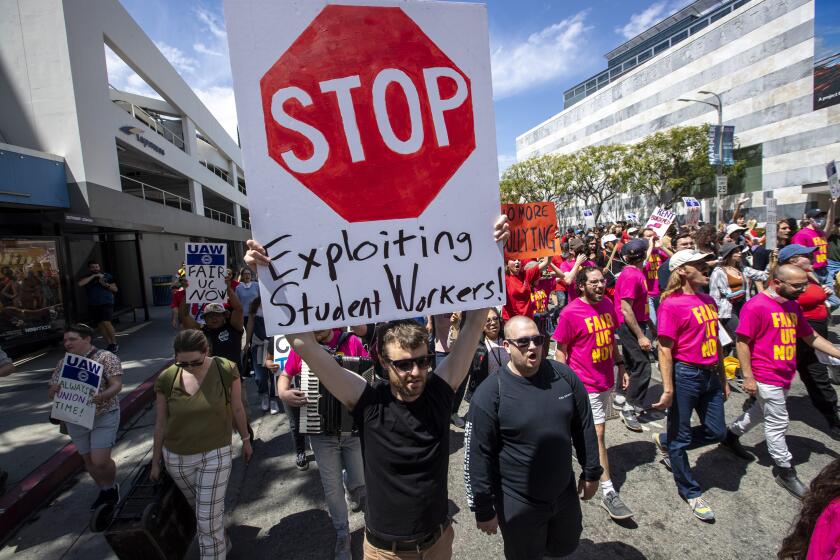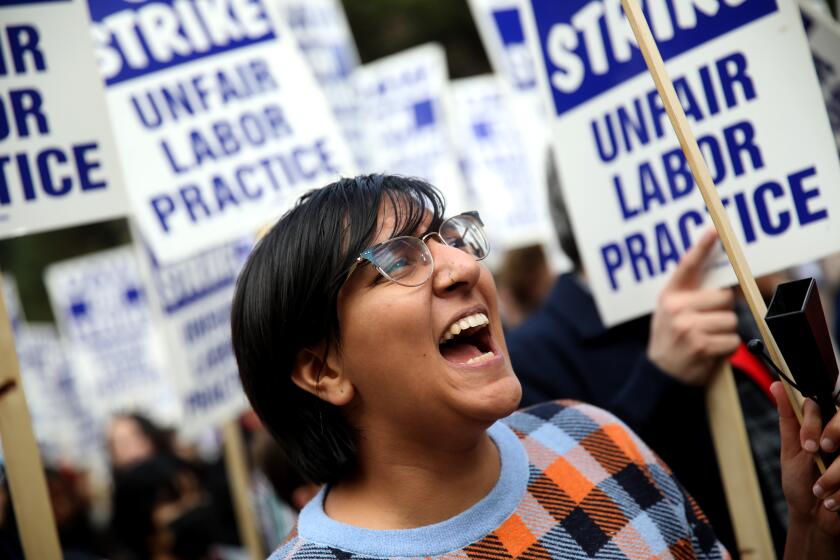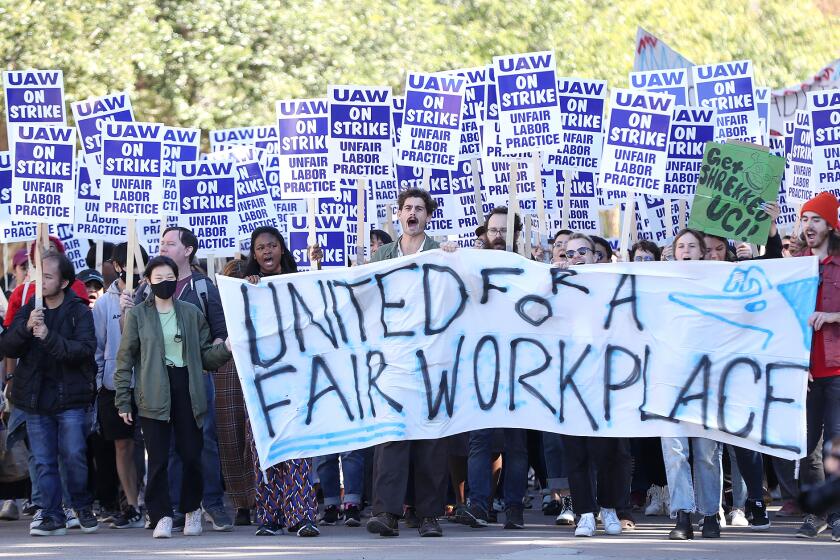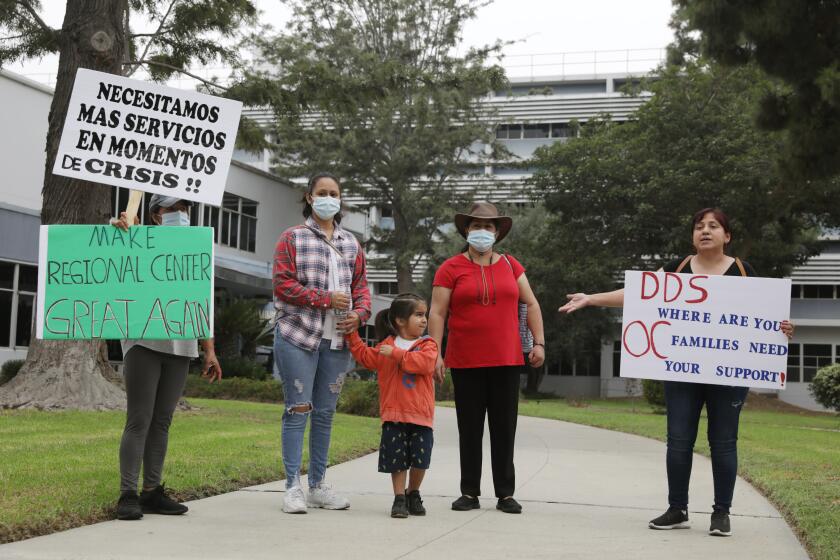Low pay, rising costs push 48,000 University of California academic workers to the picket line
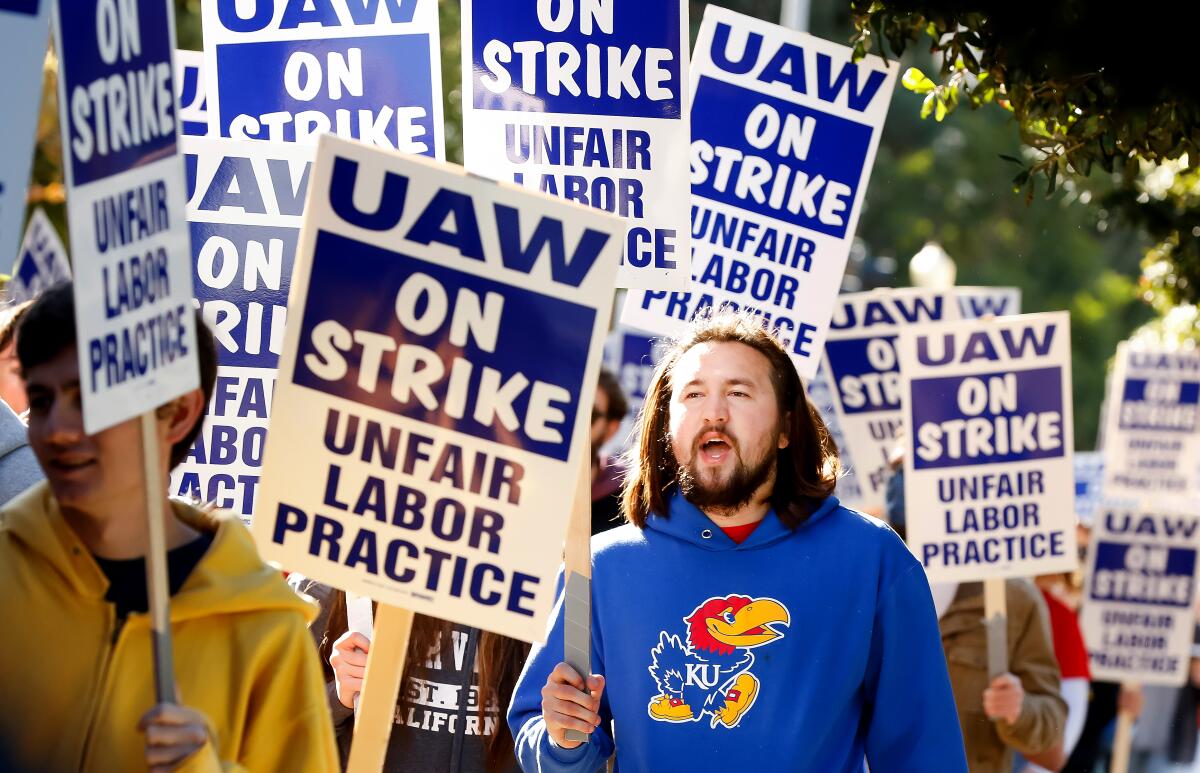
- Share via
In a historic strike of about 48,000 academic workers across the University of California system, unionized employees are pushing for better compensation and protections, as their work stoppage on Tuesday continued to cause noticeable disruptions to campus research, teaching and grading.
After the first day of the strike — which has no set end date — university officials Monday evening called for a “neutral private mediator” to help reach a compromise. Union leaders, however, continue to call on UC officials to come back to the table to bargain.
“We really want to get to negotiations as soon as possible; our teams are ready around the clock,” said Nick Geiser, a bargaining team representative with the Student Researcher Unit — the only one of the four guilds that university officials met with Monday. He said in two hours of bargaining, they were able to reach tentative agreements on three priorities about recruiting and educating new members — but progress was not made on high-priority demands, such as increasing compensation and improving support for working parents.
“The biggest sticking point, both today and in previous sessions, centers on compensation,” said Rafael Jaime, a UCLA doctoral candidate and president of United Auto Workers Local 2865, which represents 19,000 teaching assistants, tutors and other academic workers. “The University [of California’s] proposals do not adequately address the affordable housing crisis confronting our members.”
Ryan King, a University of California system spokesperson, said UC believes its current offers are sufficient.
“These employees make meaningful contributions to the university’s teaching and research mission in both part-time and full-time roles, and we believe our offers of fair pay, quality health and family-friendly benefits, among other proposals, are fair, reasonable, and responsive to the union’s concerns,” King wrote in a statement.
Nearly 48,000 University of California graduate students -- the backbone of the esteemed higher education system who research, mentor and teach undergraduates -- are poised to strike.
The 48,000 workers make up four UAW bargaining units, which each represent a different group of academic workers: postdoctoral scholars, academic researchers, graduate student researchers and academic student employees, which includes teaching assistants and tutors. The employees span UC’s 10 campuses and its Lawrence Berkeley National Laboratory.
So what are the main issues motivating workers on the picket line?
Better compensation
Union leaders are asking for large wage increases for academic workers, noting that housing costs on and near many UC campuses have continued to rise, making the majority of their members “rent-burdened,” which means they spend more than 30% of their income on rent.
They want to see graduate student workers — who are teaching assistants and tutors — earn a base salary of $54,000, which amounts to an increase of more than double these workers’ average current pay of about $24,000, according to the union. For postdoctoral employees, the union has called for a minimum salary of $70,000, which would be, on average, a $10,000 increase, Jaime said.
Surveys by the UAW found that 92% of graduate workers and 61% of postdoctoral scholars were rent-burdened.
UC officials have offered a salary scale increase of 7% the first year for certain graduate student workers and 3% in each subsequent year — an offer that union leaders say falls short.
The UC strike is calling for better pay and benefits for teaching assistants, postdoctoral scholars, graduate student researchers, tutors and fellows.
But King also noted that most of these graduate employees are working part-time while earning a graduate degree.
“Compensation is just one of the many ways in which they are supported as students during their time with the University,” King said.
But union leaders point out that graduate workers deserve a living wage while powering UC’s cutting-edge research and premier coursework, even if they are technically part-time workers. They want to see the totality of workers’ compensation detailed in the contract to ensure it is transparent and fair.
“$24,000 for an average grad worker is really undignified, it falls well below a living wage,” Jaime said. “If you talk to any grad student researcher, they’ll tell you they do not work 20 hours a week.” He said they are often expected to work for double those hours, if not more.
More support for parents
Union leaders are demanding $2,000-a-month reimbursement for child care, full tuition subsidies for UC child-care programs and expanded paid family leave options.
“A lack of support for parent-workers forces too many people out of academia and contributes to a crisis in gender equity at UC,” UAW leaders said on their website. “Primary caregivers, many of whom identify as women, are disproportionately impacted by UC’s lack of reasonable childcare subsidies and other family benefits.”
About 48,000 unionized academic workers at UC campuses across the state walked off the job on Monday morning.
University officials have proposed a new child-care reimbursement program that would provide up to $2,500 a year for eligible postdocs and, for graduate students, an increase of $750 per academic year, to $4,050 from $3,300. The university is also offering to increase paid pregnancy and family leaves, with different proposals for different bargaining units.
Reduced costs for international student workers
The UAW bargaining platform also asks for university officials to add the Non-Resident Supplemental Tuition fee — which can be up to $15,000 annually — to tuition remission for international academic workers. One doctoral candidate from China recently wrote on Medium.com that UC was the only school out of the seven to which he was admitted that charged the additional tuition fee to international students.
University officials have not made an offer on this point, noting that eliminating the fee to nonresident academic workers would be “a financial benefit not afforded to other students.”
Commuting and disability support; bullying protections
Unionized workers have also demanded free public transit passes for academic workers, cash incentives to commute sustainably and subsidies to purchase and maintain bikes and e-bikes, as well as improved campus cycling infrastructure, according to the UAW.
They also want to see easier access to accommodations for workers with disabilities, as well as better job protections, such as programs that can support researchers with gaps in funding.
Spending on services for Californians with developmental disabilities varies widely by race, ethnicity and where they live, according to a new report.
The one major point that university and union officials have reached a tentative agreement on is protections against bullying and codifying a reporting and grievance system for such mistreatment.
But substantial progress seemed unlikely, at least Tuesday, as university officials offered to meet with only one of the four units in the afternoon, and had made no offer to meet again with the other bargaining teams.
“That’s 24 wasted hours that the university is refusing to come to the table with the union,” said Geiser, who sits on one of the bargaining committees not called to the table Tuesday. “We are ready.”
More to Read
Sign up for Essential California
The most important California stories and recommendations in your inbox every morning.
You may occasionally receive promotional content from the Los Angeles Times.
